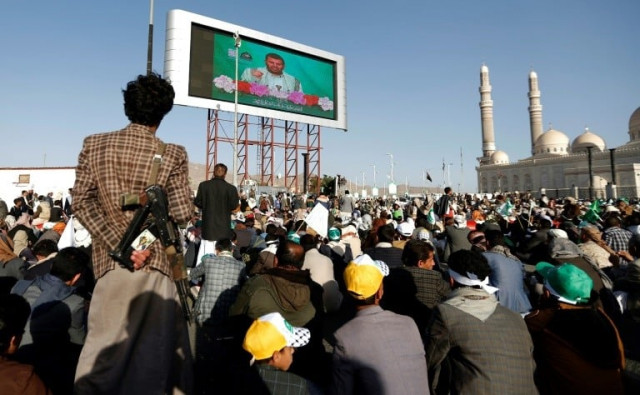Yemen leader orders advance on capital after rebel pact collapses
Witnesses reported fresh clashes between forces loyal to ex-president Ali Abdullah Saleh and Iran-backed Houthi rebels

PHOTO: AFP
Witnesses reported fresh clashes between forces loyal to ex-president Ali Abdullah Saleh and Iran-backed Houthi rebels, who together seized control of Sanaa from the internationally recognised government three years ago.
Their alliance has unravelled over the last week, with fierce battles breaking out across the capital, accusations of betrayal and Saleh reaching out to the Saudi-led coalition battling the insurgents.
UN leaders concerned about new fighting in Yemen, demand lifting blockade
President Abedrabbo Mansour Hadi, whose government operates from the southern city of Aden, moved to take advantage of the chaos on Monday.
"The president has ordered Vice President Ali Mohsen al-Ahmar, who is in Marib (east of Sanaa), to activate military units and advance towards the capital," an official in the presidency told AFP, speaking on condition of anonymity.
The government also reached out to Saleh and his supporters with an offer of amnesty.
"The president will soon announce a general amnesty for all those who collaborated with the Houthis in recent months and who have retracted that allegiance," Prime Minister Ahmad Obaid bin Daghr said.
"We will stand with everyone who stands against the Houthis... in the face of the Iranian threat," he said.
Saudi Arabia threatens nations who back Yemen probe
The Saudi-led coalition and the Yemeni government accuse Iran of arming the Houthis, which Iran denies.
The Saleh-Houthi alliance has been fraught since its inception in 2014, when the two ended decades of enmity and joined ranks to capture Sanaa from Hadi's government.
Saudi Arabia, accusing arch-rival Iran of backing the rebels, intervened in the Yemen war on behalf of the government the following year.
A Saudi-led military coalition has been hitting Sanaa with air strikes for months. A fresh wave on Monday targeted areas near Sanaa International Airport and the interior ministry, both under Houthi control, according to residents and a source in the airport.
The coalition on Monday warned Yemeni civilians to avoid rebel areas.
Saudi prince killed in helicopter crash near Yemen border
Residents near the airport said multiple air raids had shaken their homes late Sunday night and in the early hours of Monday.
An airport source said rebel bases near the location appeared to have been targeted, but the airport itself had not been bombed.
Residents reported that the fighting, which erupted Wednesday, had spread outside the capital.
Tribal sources in Saleh's hometown Sanhan, south of Sanaa, on Monday reported intense overnight fighting between the Houthis and Saleh loyalists.
The Houthis on Monday also claimed they were closing in on key members of Saleh's party.
Witnesses said clashes had erupted around the residence of Tarek Saleh, a nephew of the former president and a leader with his forces.
UN agrees to send war crimes investigators to Yemen
The clashes in the capital had killed some 60 people as of Sunday.
There was no immediate information available Monday on fresh casualties.
Since 2014, Sanaa has been jointly controlled by Saleh and the Houthis, who set up their own government there after ousting Hadi's administration, and for two years fought the Saudi-led coalition together.
Saleh on Saturday announced he was open to talks with Saudi Arabia and its allies on condition they ended their crippling blockade on Yemen's ports and airports.
That dealt a serious blow to his already fragile alliance with rebel chief Abdul Malik al-Houthi.
The Saleh-Houthi split sparked fears of a new front in the Yemen war, which has already claimed more than 8,750 lives since the Saudi-led coalition joined the war.
The conflict has pushed Yemen to the brink of mass starvation and triggered what the United Nations has called the world's worst humanitarian crisis.
International aid groups warned on Monday they were losing the ability to reach civilians in the Yemeni capital.
"Ambulances and medical teams can't access injured, people can't buy food and other supplies," UNICEF's Rajat Madhok said on Twitter.
Ambulances and med teams cant access injured, people cant buy food &other supplies.Aid workers can't travel and implement critical life-saving programmes. This latest violence couldn't come at a worse time as #Yemen is currently the world’s largest humanitarian crisis. @UNSecyGen
— Rajat Madhok (@jakuzzee) December 4, 2017
"Aid workers can't travel and implement critical life-saving programmes. This latest violence couldn't come at a worse time."



















COMMENTS
Comments are moderated and generally will be posted if they are on-topic and not abusive.
For more information, please see our Comments FAQ